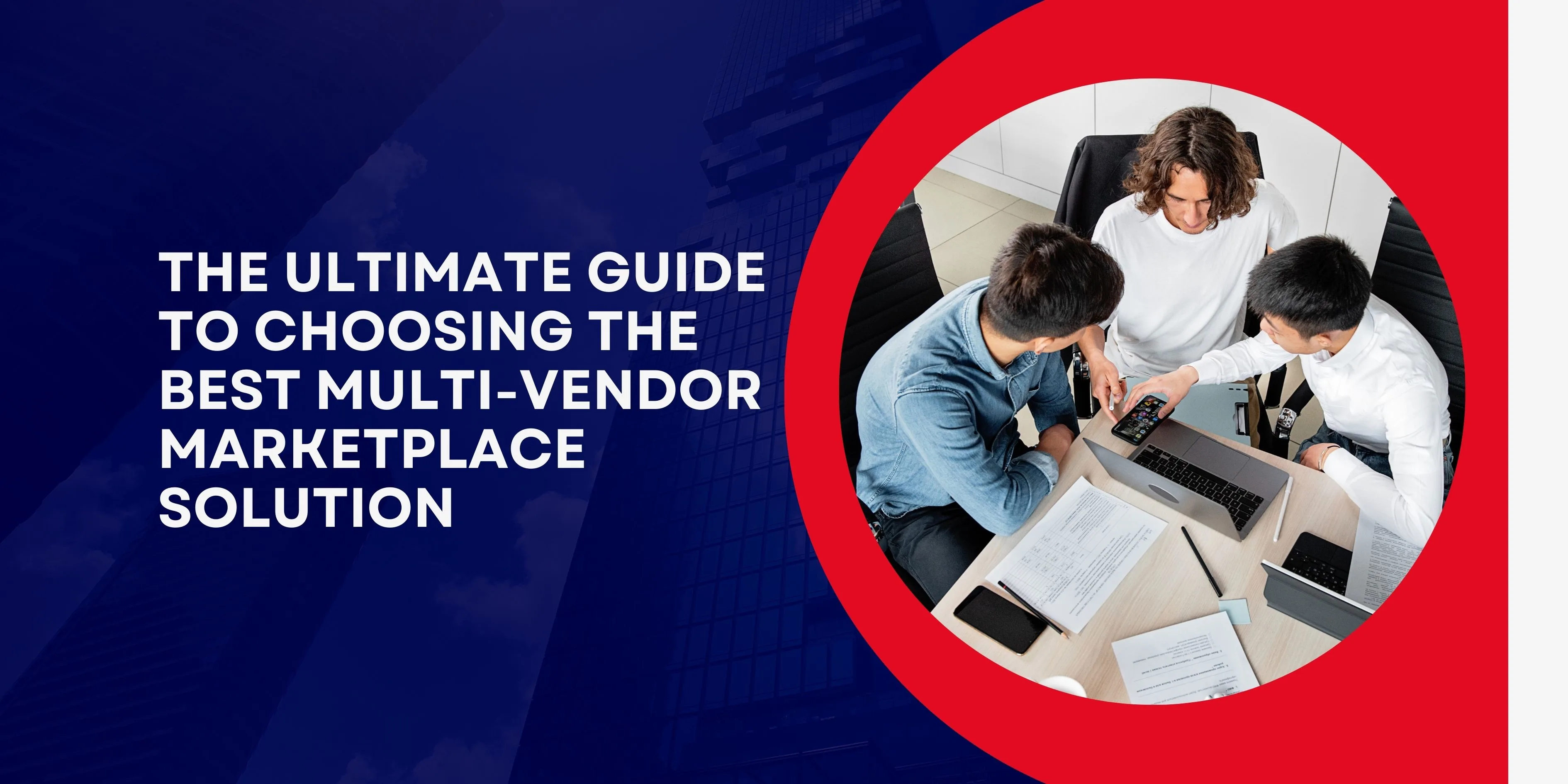The Ultimate Guide to Choosing the Best Multi-Vendor Marketplace Solution

Strong 8k brings an ultra-HD IPTV experience to your living room and your pocket.
In today’s fast-evolving digital economy, eCommerce has firmly rooted itself as the dominant force in global retail. According to Statista, global eCommerce sales are projected to reach $8.1 trillion by 2026, with online marketplaces leading the charge. From Amazon and eBay to niche platforms like Etsy and StockX, multi-vendor marketplaces are reshaping the retail landscape.
If you’re an entrepreneur or enterprise planning to launch your own online marketplace, choosing the best multi-vendor marketplace solution is one of the most crucial decisions you'll make. With the right platform, you can streamline operations, attract vendors, and scale efficiently. But how do you navigate the many choices out there?
This comprehensive guide will help you understand what a multi-vendor marketplace solution is, explore key factors to consider, and show you how to choose the best multi-vendor marketplace solution for your business goals.
What is a Multi-Vendor Marketplace Solution?
A multi-vendor marketplace solution is a software platform that enables multiple independent vendors to list, sell, and manage their products or services on a centralized online marketplace. As the marketplace owner (admin), you oversee the operations, process transactions, earn commissions, and ensure a seamless buyer and seller experience.
These platforms provide:
Vendor dashboards
Product and inventory management
Payment gateway integrations
Order tracking and shipping support
Customer reviews and rating systems
Admin control over the marketplace
Essentially, the software acts as the technological backbone of your online marketplace, automating processes and offering scalability to handle hundreds—or even thousands—of vendors.
Popular examples of multi-vendor marketplaces include Amazon, Flipkart, Walmart, and niche-specific marketplaces like ThemeForest or Udemy.
Things to Consider When Choosing the Multi-Vendor Marketplace Solution
Choosing a marketplace solution is not a one-size-fits-all process. Different businesses have different goals, vendor types, target audiences, and operational needs. Here are the most important factors to help you choose the best multi-vendor marketplace solution for your project:
1. Business Model Compatibility
First, determine your business model. Are you creating a B2B, B2C, or C2C marketplace? Do you want to sell physical goods, digital products, or offer services? The platform should align with your niche and be adaptable to your monetization model—whether through commissions, subscriptions, or listing fees.
2. Ease of Use and Vendor Management
A user-friendly interface is critical for both admins and vendors. Vendors should have access to:
A simple dashboard
Bulk upload functionality
Order management tools
Communication features (e.g., with customers or support)
Admins should easily control vendor approvals, manage disputes, and configure commissions.
3. Customization and Scalability
Your marketplace should grow with your business. Look for:
Flexible architecture
Customizable front-end and back-end
Scalable database and infrastructure support
A rigid, hardcoded solution might hinder your ability to evolve over time.
4. Payment Gateways and Payouts
The solution should support multiple secure payment gateways and allow smooth vendor payouts. It should also comply with regional regulations and offer features like split payments, tax calculations, and invoice generation.
5. Mobile Responsiveness and Apps
More than 70% of eCommerce traffic comes from mobile devices. Choose a platform with a responsive design and native mobile app options to capture mobile shoppers effectively.
6. Third-Party Integrations
A powerful API and integration support for tools like CRM, ERP, email marketing, analytics, and accounting software can save time and enhance functionality.
7. Security Features
Choose a platform that prioritizes security with features like:
SSL encryption
Two-factor authentication
Data backup and recovery
Role-based access controls
8. SEO and Marketing Tools
Built-in SEO features, customizable URLs, and marketing tools (discounts, coupons, abandoned cart recovery, etc.) are key for driving traffic and boosting sales.
9. Customer Support and Community
Your chosen vendor should offer robust support via chat, email, or phone. Also, an active community or knowledge base can be a big plus when troubleshooting or customizing features.
10. Pricing and Licensing
Marketplace solutions come in various pricing models: one-time license, subscription-based, or revenue-sharing. Weigh the long-term costs and evaluate if you get complete ownership of the code or if you’re locked into the vendor’s ecosystem.
Why Yo!Kart is the Best Multi-Vendor Marketplace Solution
If you’re looking for a reliable, customizable, and future-ready platform, Yo!Kart is one of the most popular and trusted names in the industry. It’s built specifically for multi-vendor eCommerce and checks off all the boxes we’ve discussed.
Here’s why Yo!Kart stands out:
Tailored for Multi-Vendor Marketplaces
Yo!Kart is not a plug-and-play eCommerce platform trying to fit into the multi-vendor space—it’s built from the ground up for marketplaces. Whether you’re launching a niche vertical marketplace or a large-scale B2B platform, Yo!Kart offers tailored solutions.
One-Time Cost with Lifetime Ownership
Unlike SaaS-based platforms that charge recurring fees, Yo!Kart offers a one-time license fee. This gives you complete ownership of your platform, with no vendor lock-in or hidden transaction charges.
Vendor-Friendly Dashboard
Yo!Kart provides a highly intuitive vendor dashboard, allowing sellers to manage listings, inventory, orders, and payouts efficiently. It also supports product catalog syncing for quick onboarding.
Pre-Integrated Features
From advanced search filters and multi-language support to real-time analytics and mobile apps, Yo!Kart is packed with built-in features that would otherwise require third-party plugins or custom development.
High Customizability
With full source code access, Yo!Kart allows unlimited customization. Whether it's design, workflow, or third-party API integration, it can be tailored to your unique business model.
Scalable and Secure
Yo!Kart uses modern technologies and robust coding practices to ensure high performance, even as your user base grows. Security best practices are baked into the platform, including GDPR compliance.
Excellent Support and Services
Yo!Kart’s support team offers post-launch technical assistance, bug fixes, and optional services like SEO optimization, UX/UI enhancements, and digital marketing strategies.
Final Thoughts
Building a successful online marketplace begins with choosing the right platform. As the global eCommerce landscape continues to evolve, your platform must be flexible, robust, secure, and scalable.
Whether you're launching a niche marketplace for artisans, a service-based gig platform, or a B2B wholesale exchange, following a strategic evaluation framework will guide you on how to choose the best multi-vendor marketplace solution.
Platforms like Yo!Kart not only offer the features you need today but also empower you to scale in the future. With the right foundation in place, you’ll be well-equipped to grow your vendor base, delight customers, and generate sustainable revenue.
Note: IndiBlogHub features both user-submitted and editorial content. We do not verify third-party contributions. Read our Disclaimer and Privacy Policyfor details.







